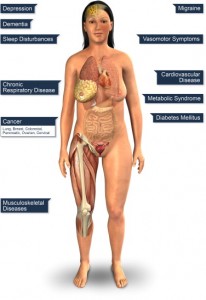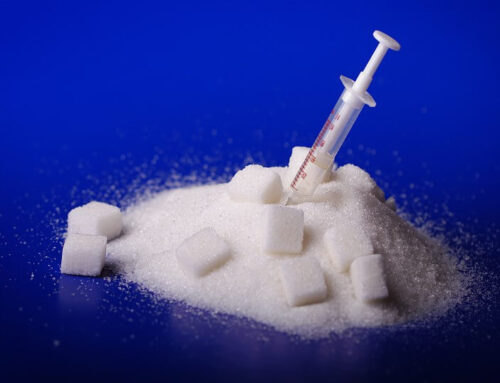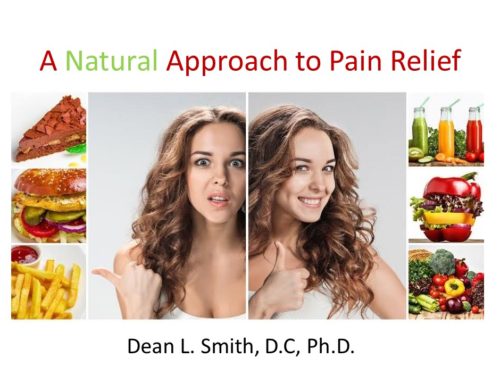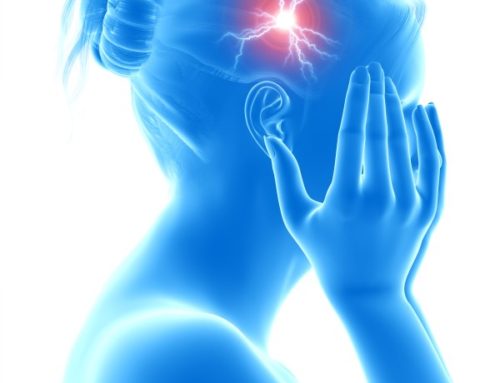 Multiple health issues affect women throughout life differently from men (or do not affect men at all). Although attention to women’s health is important in all stages in life, health among middle-aged and elderly women has not received enough attention by researchers and policy-makers. To improve women’s quality of life and promote a long-lasting and active role for middle-aged and elderly women in society, prevention of chronic diseases and disability is key. Based on the best available science and the Global Burden of Disease study, the top eleven major health issues in peri- and postmenopausal women were found to be: cardiovascular disease, musculoskeletal diseases, cancer, dementia, chronic respiratory disease, diabetes, metabolic syndrome, depression, vasomotor symptoms or hot flashes, sleep disturbances and migraine. Most but not all of these conditions are closely related to menopause. In menopause many, if not all, health issues are connected to changing estrogen levels. So, stabilizing hormonal levels seems an obvious strategy to prevent and treat menopausal health issues. Most guidelines for health problems affecting menopausal women describe optimizing/improving nutrition and lifestyle as – the first-option for prevention and treatment. In particular, poor diet, physical inactivity, alcohol and smoking are related to negative outcomes on most of the described conditions. For instance, a Mediterranean diet is associated with low mortality (higher longevity) and reduced risk of developing chronic diseases, including cancer, the metabolic syndrome, depression and cardiovascular and neurodegenerative diseases. Some dietary components, such as olive oil, antioxidants, omega-3 and -6 polyunsaturated acids, polyphenols and flavonoids, offer beneficial anti-aging effects (anti-chronic diseases and increased longevity). Likewise, physical activity is a potent tool for health promotion and disease prevention in perimenopausal women as well as in the population as a whole. Unfortunately, less than half of the population regularly participates in physical activity at even the minimal level required for health benefits, and adherence to physical activity guidelines is even lower among women ages 40 to 60. All clinicians should prescribe regular physical activity to their patients and enhance their ongoing efforts to promote physical activity among midlife women.
Multiple health issues affect women throughout life differently from men (or do not affect men at all). Although attention to women’s health is important in all stages in life, health among middle-aged and elderly women has not received enough attention by researchers and policy-makers. To improve women’s quality of life and promote a long-lasting and active role for middle-aged and elderly women in society, prevention of chronic diseases and disability is key. Based on the best available science and the Global Burden of Disease study, the top eleven major health issues in peri- and postmenopausal women were found to be: cardiovascular disease, musculoskeletal diseases, cancer, dementia, chronic respiratory disease, diabetes, metabolic syndrome, depression, vasomotor symptoms or hot flashes, sleep disturbances and migraine. Most but not all of these conditions are closely related to menopause. In menopause many, if not all, health issues are connected to changing estrogen levels. So, stabilizing hormonal levels seems an obvious strategy to prevent and treat menopausal health issues. Most guidelines for health problems affecting menopausal women describe optimizing/improving nutrition and lifestyle as – the first-option for prevention and treatment. In particular, poor diet, physical inactivity, alcohol and smoking are related to negative outcomes on most of the described conditions. For instance, a Mediterranean diet is associated with low mortality (higher longevity) and reduced risk of developing chronic diseases, including cancer, the metabolic syndrome, depression and cardiovascular and neurodegenerative diseases. Some dietary components, such as olive oil, antioxidants, omega-3 and -6 polyunsaturated acids, polyphenols and flavonoids, offer beneficial anti-aging effects (anti-chronic diseases and increased longevity). Likewise, physical activity is a potent tool for health promotion and disease prevention in perimenopausal women as well as in the population as a whole. Unfortunately, less than half of the population regularly participates in physical activity at even the minimal level required for health benefits, and adherence to physical activity guidelines is even lower among women ages 40 to 60. All clinicians should prescribe regular physical activity to their patients and enhance their ongoing efforts to promote physical activity among midlife women.



